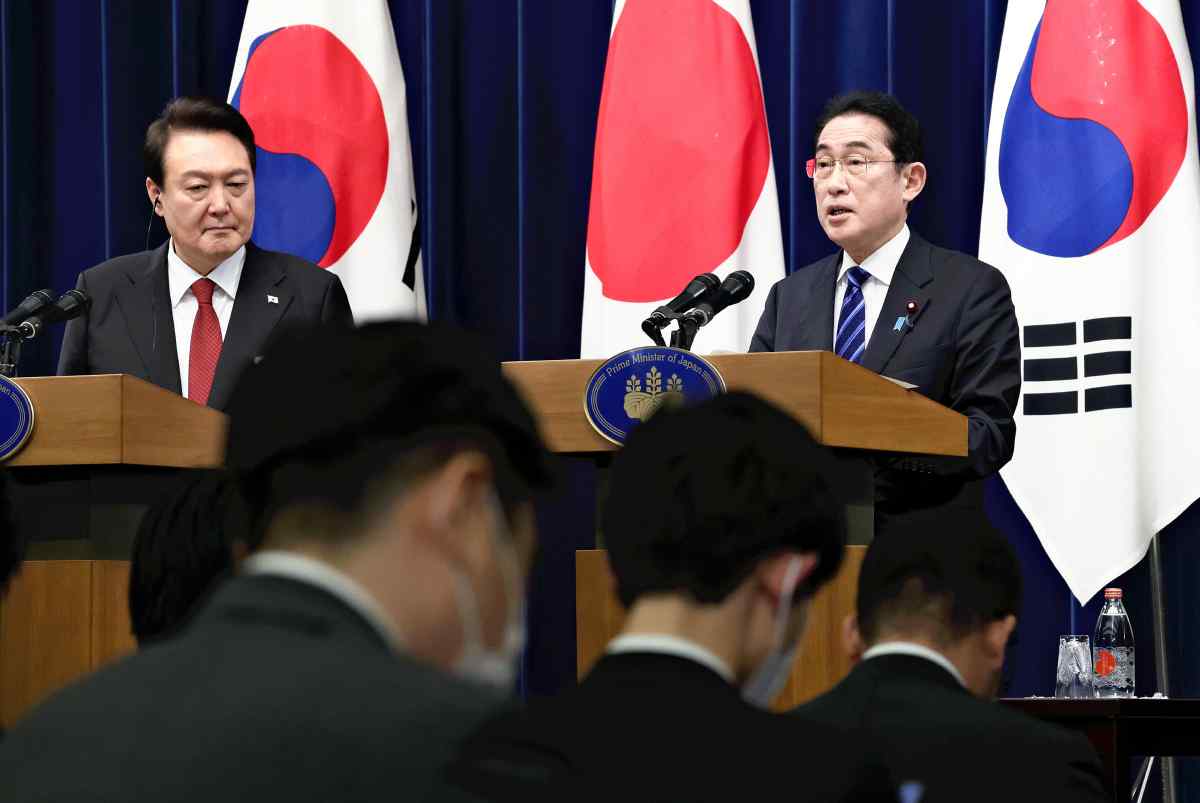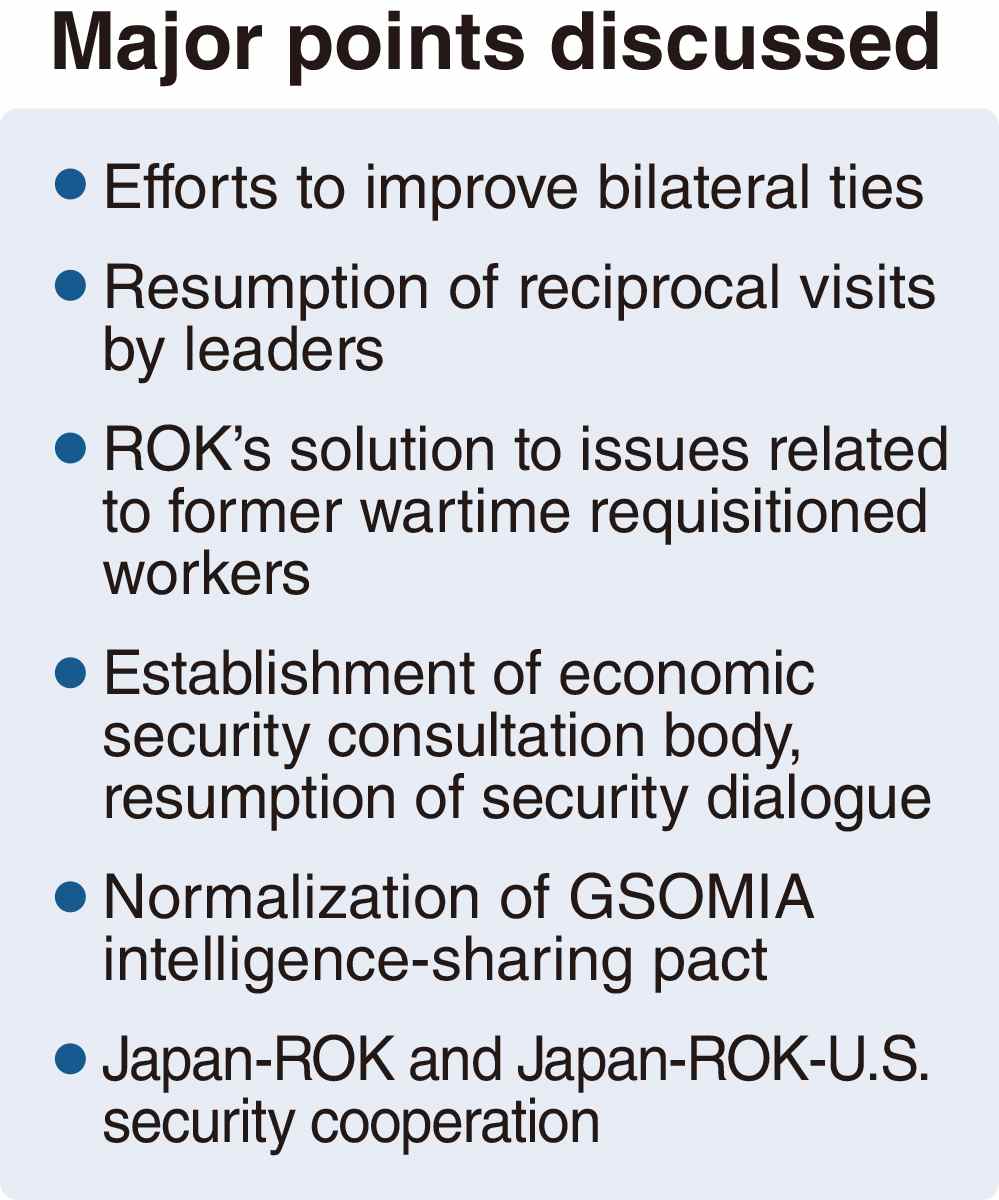
Prime Minister Fumio Kishida, right, and South Korean President Yoon Suk Yeol hold a joint press conference on Thursday in Tokyo.
20:07 JST, March 17, 2023
Prime Minister Fumio Kishida and South Korean President Yoon Suk Yeol signaled a thaw in bilateral relations at the Japan-South Korea summit in Tokyo on Thursday.
The talks set the stage for both sides to demonstrate to each other and beyond their determination to normalize bilateral relations, which had been described as “the worst” they have been in the postwar era.
Following Thursday’s talks, the two leaders expressed intentions to build a relationship of trust, which is expected to lead to the resolution of various issues and the establishment of a strategic cooperative relationship.
The summit lasted about 85 minutes, comprising a small group meeting and a plenary session. Both leaders appeared at the plenary session with smiles on their faces after the group meeting.
“Cherry blossoms have already bloomed in Tokyo. We have seen the full-fledged arrival of spring,” Kishida said at the plenary session.
Kishida’s comment about the season was interpreted by some as a reference to the thaw in Japan-South Korea relations.
“The bilateral relations between the two countries, which have experienced difficulties due to various issues, are starting anew,” replied Yoon.
Kishida had high expectations for the summit, according to sources close to the Prime Minister.
“There are many things that need to be done between Japan and South Korea. I want to make the summit meeting the start of that process,” Kishida reportedly said to an aide before the meeting.

n
Deepening the trust between the two leaders was the most important goal of the summit meeting, according to a senior Foreign Ministry official who has been involved in talks on the issue of the lawsuit regarding former wartime requisitioned workers from the Korean Peninsula.
The first meeting between the two leaders last June in Spain on the sidelines of an international conference lasted only a few minutes.
After the summit meetings on Thursday, Kishida and Yoon dined together, suggesting that the distance between the two leaders has narrowed.
Yoon was to give a speech at a private university in Tokyo on Friday afternoon, before returning to South Korea.
South Korea is Japan’s nearest neighbor, but the leaders of both countries have not conducted reciprocal visits for 12 years because of the mutual distrust that has built up.
The relationship between the leaders faced a hurdle in the form of a South Korean judicial decision that rekindled a historical spat and triggered tensions in South Korea and Japan.
The relationship between former Prime Minister Shinzo Abe and former South Korean President Park Geun-hye was initially confrontational over the issue of so-called comfort women. “I got the impression that Park didn’t want me to talk to her,” Abe wrote in his memoir.
Park’s successor Moon Jae-in also did not get along with Abe. In 2019 Moon attended a Group of 20 summit in Osaka, but did not meet with Abe.
Kishida has been cautious about hasty efforts to improve bilateral relations with South Korea. He was directly involved in the 2015 agreement over the issue of comfort women. The agreement was subsequently scrapped.
As a result, Kishida might have been reluctant to make concessions on the issue of former requisitioned workers.
He has repeatedly stated that he was waiting for South Korea to make a decision.
Yoon has a unique background. He served as a prosecutor and has no political experience. His decisiveness set the environment for the summit meeting.
“The president is an excellent conversationalist,” a close aide to Yoon said. “The president probably wanted to firmly set the course for improved relations through face-to-face talks.”
Pending issues
There are still pending issues between Japan and South Korea, including an incident in which a South Korean military vessel directed its radar at a Maritime Self-Defense Force plane in 2018.
Improved relations between the top leaders could provide the impetus for resolving various issues.
At a press conference on Tuesday, MSDF Chief of Staff Adm. Ryo Sakai expressed his willingness to resolve the radar issue, saying, “The time is ripe.”
Meanwhile, the Economy, Trade and Industry Ministry announced a relaxation of strict export control measures against South Korea prior to the summit meeting.
Japan and South Korea share values such as democracy and their interests on security issues overlap in many fields.
Networks of like-minded countries, such as the Quad framework comprising Australia, India, Japan and the United States, are becoming increasingly important in order to maintain a free and open international order.
Efforts to stabilize the Indo-Pacific region will benefit from a thaw in the Japan-South Korea relationship, which has been a source of instability.
Will the two leaders overcome historical distrust and build a strategic relationship that maximizes the national interests of both countries?
“Based on the foundation of friendly and cooperative relations since the normalization of diplomatic relations in 1965, we will further advance Japan-South Korea relations,” Kishida said at a joint press conference. “I would like to affirm with Mr. Yoon our relationship of trust and keep on closely communicating with him.”
Top Articles in Politics
-

Japan PM Takaichi’s Cabinet Resigns en Masse
-

Sanae Takaichi Elected Prime Minister of Japan; Keeps All Cabinet Appointees from Previous Term
-

Japan’s Govt to Submit Road Map for Growth Strategy in March, PM Takaichi to Announce in Upcoming Policy Speech
-

LDP Wins Historic Landslide Victory
-

LDP Wins Landslide Victory, Secures Single-party Majority; Ruling Coalition with JIP Poised to Secure Over 300 seats (UPDATE 1)
JN ACCESS RANKING
-

Producer Behind Pop Group XG Arrested for Cocaine Possession
-

Japan PM Takaichi’s Cabinet Resigns en Masse
-

Japan Institute to Use Domestic Commercial Optical Lattice Clock to Set Japan Standard Time
-

Man Infected with Measles Reportedly Dined at Restaurant in Tokyo Station
-

Israeli Ambassador to Japan Speaks about Japan’s Role in the Reconstruction of Gaza





















